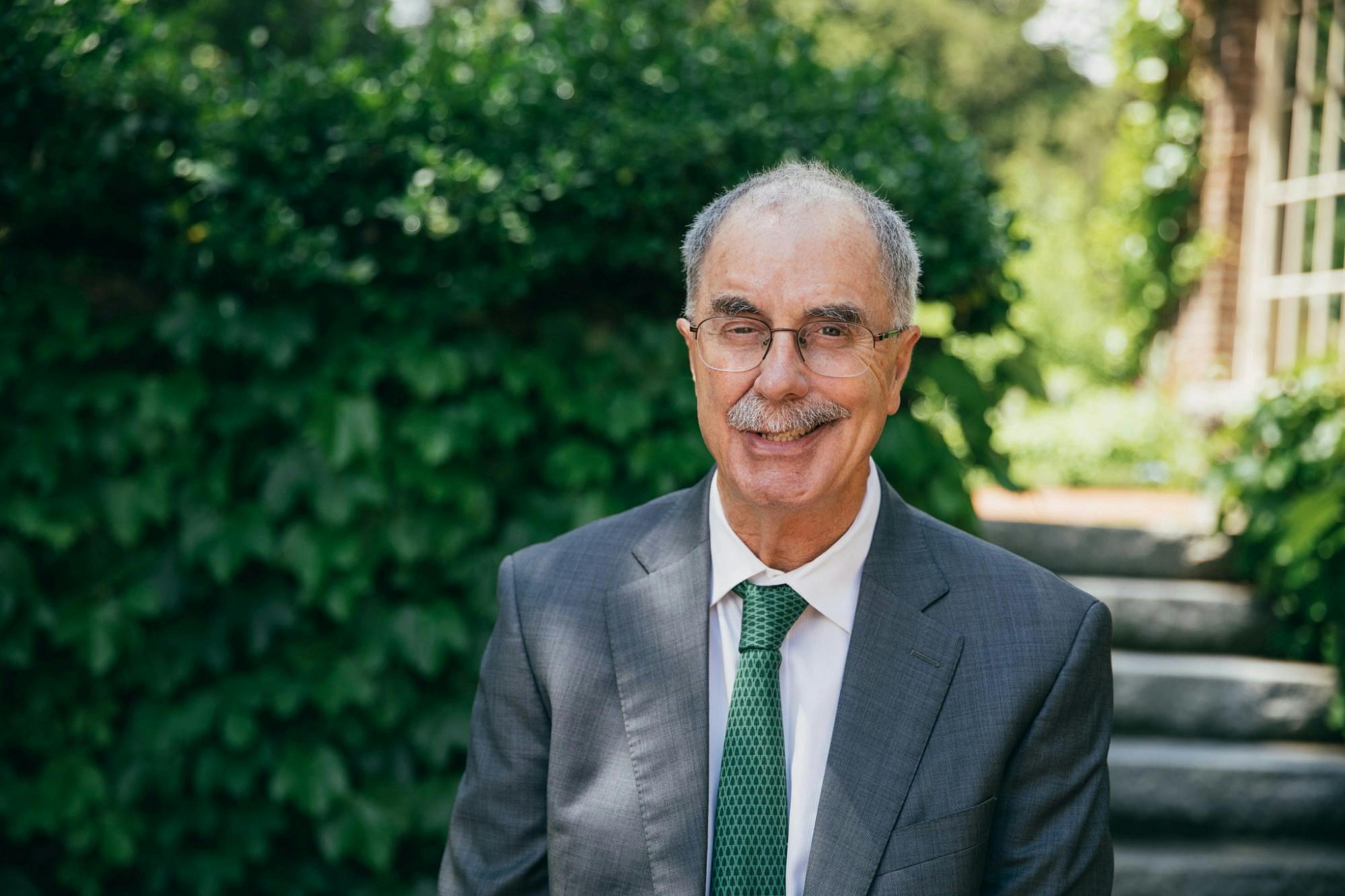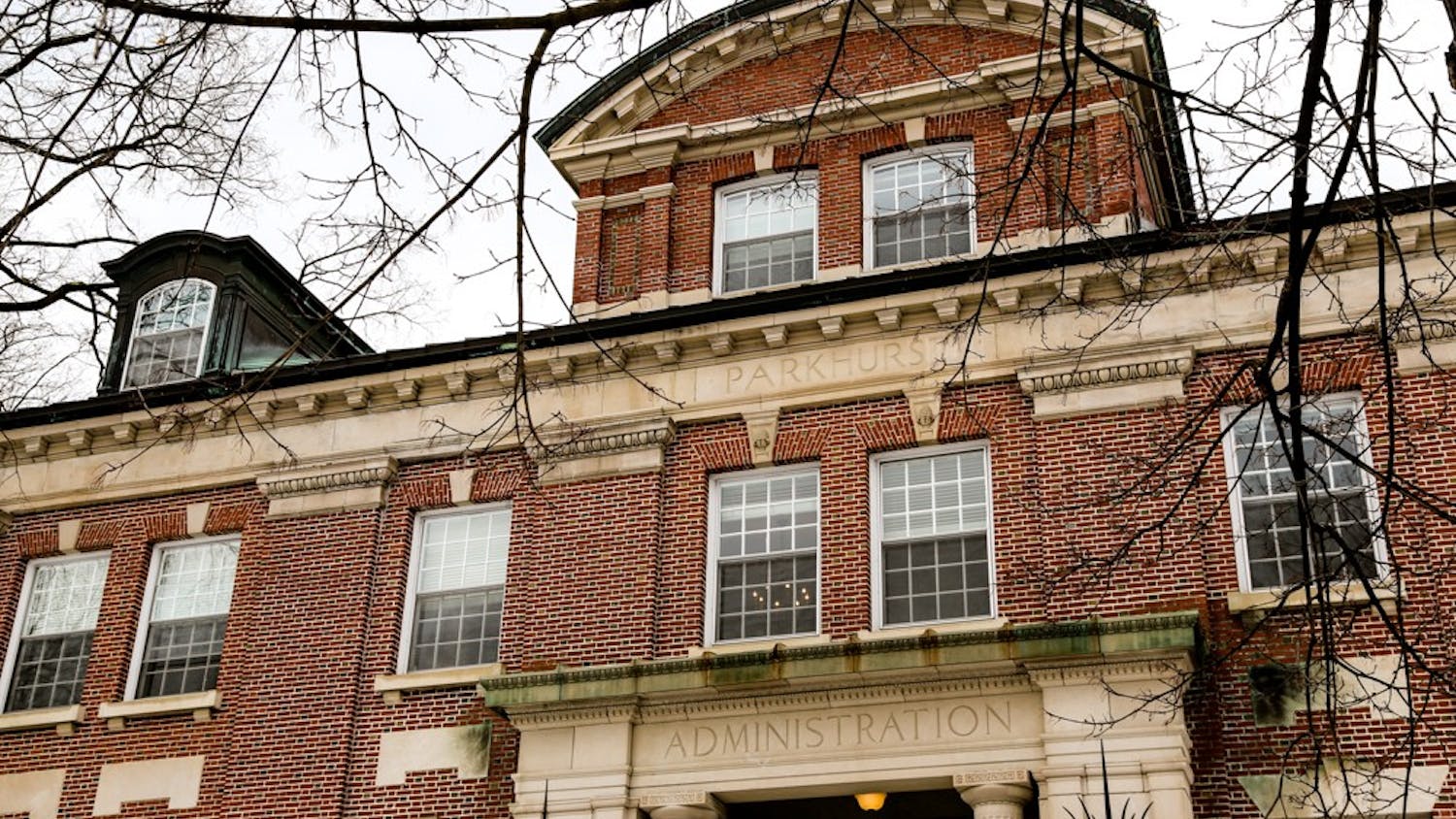This article is featured in the 2021 Spring special issue.
College President Phil Hanlon graduated from Dartmouth in 1977 with a Bachelor of Arts degree in mathematics. After nearly three decades in teaching and administration at the University of Michigan, he returned to Hanover to take on his current role in 2013, serving as the 18th president of the College and as a professor in the mathematics department. The Dartmouth sat down with President Hanlon to discuss all things pandemic-era — struggles faced by the College, commitments to racial justice, and COVID-19’s impact on higher education going forward.
As an administrator, what would you say that Dartmouth struggled with the most during the pandemic, and how did you address that challenge?
PH: So the pandemic was, first of all, unlike anything that any of us have experienced before. There really was no playbook, and that was one problem. Second is it came at us really fast. I distinctly remember last March, within a 72-hour period, everything about the way we conducted business changed. And then third was, it wasn't just a health issue. How do we operate? How do we teach? How do we continue to do research while keeping the campus healthy? How do we deal with the mental health challenges that come from isolation and a lack of connection? Then, how do we deal with very severe financial issues? These came not just from lost revenue, because we didn't have as many students in housing and we were keeping the housing staff and dining staff on. It also came because of the broad-based economic fallout, which meant that the financial aid needs of our students skyrocketed, and we were committed to meeting those. So I think what was really a challenge was trying to deal with all four of those challenges at the same time, without any kind of track record of how to deal with this kind of thing.
On the other hand, what did Dartmouth struggle with the least during the pandemic? Why do you think that is?
PH: I have, over the course of this term, been having group interviews with faculty, six at a time, from all across the institution. One of the things I'm doing in these meetings is trying to catch up with their experiences during the pandemic. One of the things that so many of them have mentioned is how much Dartmouth students stepped up during this time, how it wasn't just faculty who threw themselves into converting courses to online — it was students adjusting to that and engaging through that mechanism. I think what I'm really proud of is the way that the community came together during this period. It wasn't easy for anyone and nobody liked it, nobody wanted to be doing this. But people really stepped up — both the faculty, the staff that provided the IT support, and then students, the way that you all adjusted to this new environment.
One other thing I'd say that was a sort of uplifting part of this really difficult time was that I became more convinced than ever about the importance and value of what we do at Dartmouth, especially in the way that the liberal arts and the education we provide, the bundle of experiential activities, prepares people for leadership. If you reflect over the last year, we had a clinic on leadership over the last year, the good and the bad. The leaders who were most successful were the ones that valued science and understood science, understood the connection between society and health and economic wellbeing, and understood that the arts can elevate the human condition. In short, the leaders that stood out to me were the ones that embodied the liberal arts, so I became more inspired than ever by the work that we do here at Dartmouth.
On that note of looking back over the course of the pandemic, what would you change about how Dartmouth responded to the pandemic and why?
PH: Well, hindsight is always 20/20, right? I mean, you can always look back and say, gee, I wish we'd tweaked this a little bit differently or done that a little bit differently. I think one thing we did well is we adjusted over the year. In the fall, we were really focused on health and we had very robust constraints on how people were interacting with each other. We learned and heard from the community that this needed to change. We heard from students that it was too locked down, that you were suffering as a result. In the winter, we did our best to adjust to that, open it up, have skating on the Green and have the Adirondack chairs and fire pits, have the morning hikes, the Skiway open. So we tried to adjust to that. Did we get it perfectly right? Did any campus get it perfectly right? Of course not. It was an incredibly complex set of challenges, and so we all did our best — made our best judgments — given the information we had in front of us.
We're working hard in these interviews I talked about — the group interviews with faculty. One of the other topics that I'm bringing up with them is, how do we reawaken the campus in the fall? So fall, hopefully back to normal, fully densified, playing sports, having bonfires, the whole thing. So what do we need to do? Or how can we stimulate the people on the campus to reconnect and reinvigorate those connections?
Dartmouth had to adapt to the pandemic and to remote learning very quickly, and the community as a whole has learned to adjust. What has Dartmouth learned from the pandemic about its students and its mission, and how will the College apply these lessons going forward?
PH: I think that there are positive takeaways, or things we experienced and implemented that we learned actually work pretty well. One is that we, by necessity, have used Zoom to bring experts into our classrooms. And we found out that we could actually get more experts to engage in our classes if they didn't have to travel to Hanover. So I think that will continue because this is great, you know, we can get Sen. Rob Portman ’78, R-Ohio, to come to campus virtually and speak to our students. We'll do a lot more of that.
I think that we've learned that some aspects of teaching work well online — for example, just rote lecturing. And there was already a move to flip classrooms — that is to say, to have students preview the lecture part. I think that the pandemic will accelerate that, or what we experienced in the pandemic will accelerate that.
I think that we learned how productive our employees can be with flexible work arrangements. And I know that many of our employees and staff liked the flexibility of being able to stay home more and work from home. And we will probably be more flexible about those arrangements in the future. So I think there's a lot of things we learned that we will want to retain from the pandemic.
And as I was discussing earlier, we also learned, at least in my mind, the importance of the work we do at Dartmouth, not just the liberal arts education, but I should have also mentioned the research we do. America's leading research universities sort of led the way in the development of vaccines and new therapies. So again, that just, to me, stressed the value of what we do here on our campus.
What was your own personal experience throughout the pandemic like? Looking back, how has your experience been with teaching a remote class and running an administration remotely, and how did those experiences differ?
PH: Yeah, in the fall I taught a more advanced math class. I'm a math professor, and it was a class that had a lot of visuals, a lot of diagrams and drawings, which I normally would do on a blackboard or chalkboard. So I had to figure out, how do I replicate that? And I realized and learned from my colleagues that I could do it with an iPad Pro, which worked somewhat, except my handwriting on the iPad is really lousy. And so, what I realized is that I really needed to figure out in advance what I was going to draw on the board, and that included what questions students might ask and what drawings I would need to make in response to their questions. I needed to prepare those in advance on paper, scan it, and send it to the students. So the upshot was that I gave a lot more thought than usual to what I was going to do in the class, what I was going to say, what I was going to put on the board, what order everything would happen in. And so it took a lot more time, but I think it was time well spent. I think I taught better as a result of that.
So that was my own experience of teaching. I deeply missed the in-person contact, I can tell you that. It just wasn't the same. I am really looking forward, actually, to having some sort of reunion with my class, once conditions are appropriate for that.
In terms of the administrative work, it was a brutal year. And it was brutal especially because of needing to give so many people so much news they didn't want to hear. So it was way back starting in March of 2020 saying, we can't have students back in spring term, we can't have Commencement, we can't have reunions, we can't have students here in the summer, we can't play sports in the fall, we have to de-densify our dorms for the whole year. So I really felt for people. As a Dartmouth student myself, I understand the magic of the Dartmouth experience. And so, it was just kind of exhausting. For me, like it was for everyone, the emotional toll of the last year was tough.
Over the past year, systemic racial injustices have risen to the forefront of our national conversation. What additional commitments beyond what has already been announced will Dartmouth make to addressing those injustices on campus and within the College?
PH: Today and every day, Dartmouth stands in solidarity against racism and wants to be an anti-racist institution. So we can start with that for sure.
One thing you may not know is that last fall, the Board of Trustees committed themselves to studying two strategic issues, and they were going to really do a deep dive into them and understand what the institution can do to address them. One of the two was creating a new, more welcoming and inclusive campus and a campus that's more anti-racist and more welcoming to all peoples. So that's one thing.
In July, we will be joined by Brown University vice president for institutional equity and diversity Shontay Delalue as our new senior vice president — a cabinet level position — and senior diversity officer. Bringing her to campus, we at the same time expanded and built out the Office of Institutional Diversity and Equity, which she will lead, and moved her reporting line directly to the President from the Provost position. We made a substantial financial commitment in doing that.
We are, beyond that, looking at how we can take these institutional commitments and couple them with philanthropic commitments. And so, already, one of the priorities in the campaign was endowing the E. E. Just Program, which supports students from systemically underrepresented minority groups who are pursuing STEM. We have already through the campaign expanded FYSEP programs significantly, both in the numbers of students it serves and in the length of the program — it's now a four-week program instead of a two-day program.
And the other thing I think that really bears mentioning is that it's been a huge priority for Dartmouth to expand the number of BIPOC faculty. We already, starting in 2017, put in place a set of initiatives aimed at expanding the number of faculty. This included things like provost funding for faculty lines, which bring diversity for faculty who are underrepresented in their fields. Also, there is implicit bias training for everyone involved in the tenure promotion process. In addition, we have a very successful postdoctoral to tenure track program, which allows us to hire faculty underrepresented in their fields, have them serve in a postdoctoral position for a couple of years and cement their scholarly work before all of the obligations of tenure track.
How will the college experience or higher education as a whole be different after the pandemic, and what can we expect from institutions like Dartmouth going forward?
PH: There’s a lot to say here, but let me just say that I think that the pandemic will have a profound impact on higher education overall. Now that every institution has experienced online learning, there will be a lot of push to understand how that can be used to increase the value of what's offered and lower the cost of what's charged. Having said that, I think that I'll come back to something I said earlier, which is what I've learned from this is the unique bundle of activities that we do at Dartmouth with our great liberal arts curriculum and our robust co-curricular and extracurricular activities is exactly the right preparation for leadership in this world. I've never been more convinced of that. And so, while I think we will take our learnings from our own online experiences this year and use them to make what we do better, I don't see us replacing this unique residential, high-touch, in-person education that we provide. I think that we're kind of at the top of the food chain in terms of the education we offer. And I think we've only seen this year how valuable that is.

Lauren ('23) is news executive editor for The Dartmouth. She is from Bethesda, Maryland, and plans to major in government and minor in public policy.



